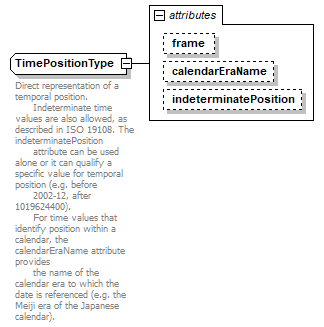| diagram |  |
||||||||||||||||||||||||
| namespace | http://www.opengis.net/gml | ||||||||||||||||||||||||
| type | extension of gml:TimePositionUnion | ||||||||||||||||||||||||
| properties |
|
||||||||||||||||||||||||
| used by |
|
||||||||||||||||||||||||
| attributes |
|
||||||||||||||||||||||||
| annotation |
|
||||||||||||||||||||||||
| source | <xs:complexType name="TimePositionType" final="#all"> <xs:annotation> <xs:documentation xml:lang="en">Direct representation of a temporal position. Indeterminate time values are also allowed, as described in ISO 19108. The indeterminatePosition attribute can be used alone or it can qualify a specific value for temporal position (e.g. before 2002-12, after 1019624400). For time values that identify position within a calendar, the calendarEraName attribute provides the name of the calendar era to which the date is referenced (e.g. the Meiji era of the Japanese calendar).</xs:documentation> </xs:annotation> <xs:simpleContent> <xs:extension base="gml:TimePositionUnion"> <xs:attribute name="frame" type="anyURI" use="optional" default="#ISO-8601"/> <xs:attribute name="calendarEraName" type="string" use="optional"/> <xs:attribute name="indeterminatePosition" type="gml:TimeIndeterminateValueType" use="optional"/> </xs:extension> </xs:simpleContent> </xs:complexType> |
attribute TimePositionType/@frame
| type | xs:anyURI | ||||||
| properties |
|
||||||
| source | <xs:attribute name="frame" type="anyURI" use="optional" default="#ISO-8601"/> |
attribute TimePositionType/@calendarEraName
| type | xs:string | ||||
| properties |
|
||||
| source | <xs:attribute name="calendarEraName" type="string" use="optional"/> |
attribute TimePositionType/@indeterminatePosition
| type | gml:TimeIndeterminateValueType | |||||||||||||||
| properties |
|
|||||||||||||||
| facets |
|
|||||||||||||||
| source | <xs:attribute name="indeterminatePosition" type="gml:TimeIndeterminateValueType" use="optional"/> |
XML Schema documentation generated by XMLSpy Schema Editor http://www.altova.com/xmlspy